
36 minute read
How confinement sucks but it helped me to rediscover my feminism, so I’m taking the win
ANONYMOUS How confinement sucks but it forced me to rediscover my feminism So I’m taking the win
Advertisement
enough”.
Though I would never say that confinement has been a positive thing for me, I do recognize that it has forced some really positive changes in my life. Before COVID-19, I was working at a job I loved, surrounded by people who supported me, and doing work that made me feel fulfilled. Except, I was wrong. It wasn’t until I had to work-from-home that I realized how depressed I was. You see, confinement stripped away all the fluff around my days so the reality of my working situation was laid bare:
1.
2.
3. What I actually loved about my job was doing bonus projects – running events and hosting a podcast – that were outside my job description and deemed “unnecessary” when social distancing started. What was left was boring and mundane. When I tried to mix things up, my supervisors instructed me to “stop trying so hard”
The people who surrounded me at work every day, the folks by whom I felt so supported, didn’t actually work with me. They just worked near me and dropped by my desk for daily chats. When I started working from home, it became clear that my actual team wasn’t supportive at all. In fact, I barely heard from anyone for the first two months of confinement and had to fight to get them to take meetings with me.
As the discourses surrounding race and gender inequities started to take over the news cycle following the murders of Breonna Taylor, George Floyd, and Regis Korchinski-Paquet, it became harder and harder to ignore that the work I was doing didn’t really matter in the grand scheme of things. I tried to figure out a way to make a difference within the parameters of my work, but I kept running into roadblocks by the people who “owned my time”, who claimed that “we already do enough”.
Somewhere between points one and two, I realized that I wanted to find a new job, but it’s actually point three that has really forced my need for change. I can’t silence the need inside of me to do something meaningful with my life. I can’t quit my job yet because I’ve had very little luck finding something else and, like so many others, I need the paycheck. Fortunately, confinement means that I have more time in the evenings to spend working on personal projects and educating myself (thanks to the fact that I don’t have other personal responsibilities such as child and family care).
I have been able to reconnect and rediscover my feminism more deeply than ever before. It’s not that I have the time for it now, it’s because the circumstances of confinement have necessitated that I get creative with the ways I seek out resources. Knowing that I couldn’t go to a bookstore to get books, and feeling immense social pressure to boycott Amazon, I downloaded the library app, Libby. It. Is. Phenomenal. It’s like I can go online shopping whenever I want for my favourite thing in the world (books!) and they’re all free. I didn’t know where to start, so I googled “what books should I read about race, body positivity, and gender violence?” I’ve read these books so far:
CHANEL MILLER MALALA YOUSAFZAI RETTA ROXANE GAY SAMANTHA IRBY LINDY WEST MARGARET ATWOOD ROXANE GAY JESS BAKER JULIE LALONDE KAI CHENG THOM TIFFANY HADDISH SONYA RENEE TAYLOR
“KNOW MY NAME” “I AM MALALA” “SO CLOSE TO BEING THE SHIT Y’ALL DON’T EVEN KNOW” “HUNGER” “WE ARE NEVER MEETING IN REAL LIFE” “SHRILL” “THE HANDMAID’S TALE” “BAD FEMINIST” “THINGS NO ONE WILL TELL FAT GIRLS RESILIENCE IS FUTILE: THE LIFE AND DEATH OF JULIE S. LALONDE” “I HOPE WE CHOOSE LOVE: A TRANS GIRL’S NOTES FROM THE END OF THE WORLD” “THE LAST BLACK UNICORN” “THE BODY IS NOT AN APOLOGY: THE POWER OF RADICAL SELF-LOVE” “FATTILY EVER AFTER”
Why show you a complete list of what I’m reading? In my feminism learning journey so far, two lessons have really solidified (more lessons are brewing, but still need time to cook). First, as a white, straight-sized, bi, cis woman, I need to use my platform – whenever I have one – to amplify BIMPOC, fat, and trans voices. And second, it’s extremely challenging to find resources. If listing what I’ve found helps you discover something new, then excellent! I’m cringing at the fact that I haven’t read anything by trans writers yet and will correct that.
Confinement has also necessitated that I get creative with the way I get involved with societal issues. I had to move back in with my parents in the suburbs because I couldn’t afford internet in my apartment – something I was perfectly fine with until I had to work from home every day. My parents followed COVID guidelines very closely, which meant I wasn’t allowed to go to the grocery store let alone a protest in the city. I had to find another way to support Black Lives Matter. I started making digital designs for people to use as Zoom backgrounds, asking that they make a donation to the cause in lieu of paying me.
Having never tried digital art in the past, I started wondering what else I could do. I looked online for “how to design things”, and this research started mixing in my mind with all the new ideas I was encountering through reading the aforementioned books. Samantha Irby, Roxane Gay, Lindy West, and Jes Baker all talked about many, many ways society isn’t designed for their bodies. Seatbelts, chairs, airplanes, clothes, and even purse straps are designed with straight-sized and able-bodies in mind – and this is hardly a comprehensive list. I’m looking at the world differently now, questioning the systems of our physical and virtual worlds. Maybe I can start using art to create designs for body positivity. Maybe I can study tangible examples of how the virtual world marginalizes BIMPOC, fat, and trans voices, and then help design ways to intervene. My plan for the next year is crystallizing. I’m going to keep learning, keep connecting, and keep creating, all while trying to find activist jobs. I’m also going to apply to go back to school for 2021 to study design activism because I strongly feel the need to put in the work.
No, I’m definitely not grateful for confinement. What I am grateful for is all the wonderful, brilliant feminists who have built infrastructures throughout our society to allow us to connect during these times. I’m grateful for feminist writers, TV and movie producers, bloggers, and the social media influencers that are carving paths for privileged people like me so that I can learn from their work and turn my life around during confinement. I commit to you that I won’t let you down. And, when I inevitably make mistakes, I’ll be gracious and return to learning. ·

In between the daily existential crisis, I find myself wandering in the deepest corridors of my mind. Looking at my feelings bottled up on a shelf, traumas and past pains not understood, maybe for the best. Gloomy memories of an autumn alone, the yellowish beige that follows me and takes me away. The midnight conversations that take us to infinity, between the dystopian worlds of our mind. But Sitting here I get lost, between one beep and the next I don’t see you, would this be the new reality? This cold emptiness that embraces me but doesn’t hold? I light another cigarette and return to my room in the confusing reality that plagues me watching the eternal dusk of this day·



JULIO BOTTONI
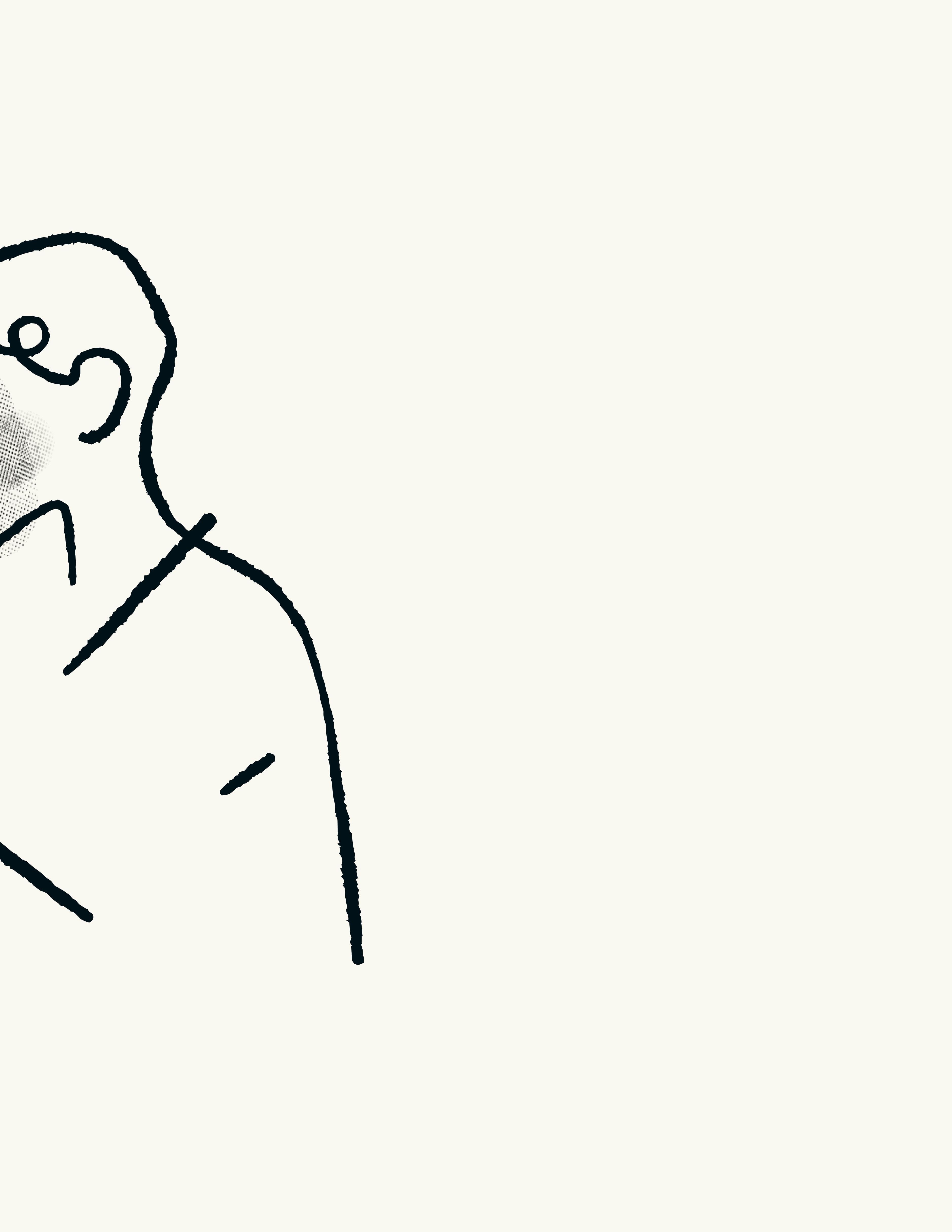


WHY DO YOU HAVE TO RUN SO MUCH?

A N A B E A T R I Z RIBEIRO
BEFORE all of this, my life was in its busiest moment. I never had any time for anything, I don’t know how often I have said to someone that I needed more than 24 hours in a day.
With the way it was going, I couldn’t fit everything I wanted to do and had to do in one day, or even in a whole week. I wanted to be a good and committed student, with good grades, which was ultimately going to make me a good professional, with a promising future, in which I would be able to help make the world a better place in some way with my work. I wanted to exercise, follow a skincare routine, take care of my hair, fit into social standards (despite saying almost every day how much I hate them). I also wanted to be there for everyone in my life in whatever capacity they needed - for the people I love, or even the ones who were passing through my life.
By meeting their deadlines and following their every will, by providing all that would be good for them and everything that would make them feel comfortable around me, so they would like me. I’d do all these things so they could notice the effort I made, so they could feel good, and so I could help them in some way.
From what I have learned since I started trying to understand myself on a deeper level, this is who I am- I always want people to like me and to feel good around me. I also like knowing that to some degree, I make a difference in their lives. However, what I have started to notice, with the assistance of my therapist and with the beginning of the pandemic (trying to take something positive from this madness), is: it is indeed great that you want to help and be good to people, but you can’t prioritise others over yourself to do so.
Why do you do what you do in your daily life? Why do you post photos on Instagram? Why do you say what you say to the people you love? How do you behave when you are getting to know someone that you want to be in your life in some way? How do you act with that person after you have already “gotten what you wanted” from them? Who are you? What motivates you? And why does it motivate you?
Those questions and many others emerged during my quarantine, once I was able to stop going mad about what was going on outside. It may sound selfish, looking inside when there is chaos out there. But if I don’t do so, I won’t know myself completely and, the less I know about me, the less I know about what I believe to be right or wrong, or even how I can potentially try to change this scenario we live in for the better.
Imagine realising that the reason for which you have done something, even if it was beneficial to someone, isn’t what you believed it was. It is very important to know who we are and why, so we can understand our values and understand what we believe in. It is really easy to lose ourselves or question something we were absolutely certain of in the past if our foundations aren’t so steady. This is important even to deconstruct concepts we have gotten “wrong” or the ones we don’t even know we have. We are much more complex than we seem. ·
























FLAVIA SCHMIDT
Life purpose
What is my life’s purpose?
The pandemic has arrived and, with it, social isolation. 15, 30, 60, 100 days have passed. In the beginning, everyone was worried: some about physical health, some about mental health and others about the economy. Something new was happening, something that we had never thought we would live through. I thought that in such a situation we would all become better beings, but that wasn’t true. Many have shown their aggressiveness, their masks have fallen. The cases of violence against women, sexual abuse and murders have risen, femicide numbers have increased substantially. I started experiencing quite intense feelings at every information and news piece I received. I stopped looking for them, but the news would make their way to me somehow. Then, I decided to heal myself from those feelings and find my inner self, starting from a simple question: What is my life’s purpose?
The question might seem simple, but the answer isn’t. After a few days thinking about it, I decided to share this question with some lovely people so they could reflect on it as well. Conflicts and crises lead to dissatisfactions, which lead to changes.
My gratitude to all of those who have joined me in this journey.
Throughout my life, my purposes have changed. As insignificant as we can be, as much as our lives only touch the people around us - such as family and friends - and “ as much as this small circle that will one day remember us will be reduced over time, we need our life purposes. I believe that those purposes must be humble, or at least achievable in the short term. There comes a time to realise that many, or the most important of them, have been reached: I have given a good man to the world, in the figure of my son; I have in his father - now my ex-husband - the best friend I could have asked for; I have a roof of my own; I believe I have been (still am) a good daughter to my mum; I have made and make friendships so fraternal that they will never let me feel alone; I work with what I like and I am recognised by my peers. What else now? What can I have as a life purpose that makes me wake up every day, at 53, with more than half of my life lived, still thirsty for more time for achievements? The purpose is almost entirely selfish, it is almost entirely dedicated to me: so I can understand that the hard work has been done; that the next days, months, years are dedicated almost exclusively to my laughter, to my readings, to my trips, to the music I learn to sing and play, to my friends. Setbacks are yet to come, many others and different from the first ones, and I want to be strong and calm to change the course, change the news, give a hand to whoever needs help for their tender purposes. Oxalá!” Adriana Torres
Well… my life purpose is to become a better nurse every day, getting more and more specialised in my profession so, in that way, I can bring a bit more comfort and peace of mind to each of my patients” Claudia E “ This is a very delicate question, due to the uncertainties lived in the current international scenario. But, at this moment, my “ life purpose is to take I am 26 and recently I have been living in Rio de Janeiro. I am from Ceará [northeast of Brazil] and I have left my ‘cradle’ in search for my life “ care of my daughter in a light way, to provide her with the sweetest purposes, aiming to achieve all my goals and make my dreams come true. Currently, my family goal is almost complete, I have by my side the best person to call my fiance, Lucas, my partner for every moment, we have two childhood possible and to insert myself back in the workplace sphere with my new dogs, Kiara and Zeus, and we are planning to have a child. Professionally clothing business. That I aim to have more than one occupation. For now, I have experience in all sectors of the restaurant industry, I am finishing my nursing technician training and I intend to have many more! I believe those are our purposes; finding comfort in our lives, being surrounded by friends, having a home way, I can achieve both my professional and personal goals”. Nathalia Marques and means of transportation, being able to help others, having a family, and having an occupation that we love and allows us to live a full life to enjoy every moment and have reciprocity in everything.” Aline Alves “ Love is the most vigorous creative power the we know in this world” Joanna De Angelis
Be love, live love, breathe love, dream love, cocreate love, overflow love. I am a being searching for evolution, for the love of others, for self love.
Flavia Schmidt F·EN 37


SAUCEPAN AND
SPOON IN HAND
THE DILEMMAS AND POSSIBILITIES OF
FIGHTING PRESENTED BY THE PANDEMIC
On the last 8th risk their lives to maintain it. our everyday life. At the same of March, 2 Today, our everyday is about time, we have witnessed the million wo survival, whether that means emergence of new forms of men marched avoiding infection or looking rebellion, where the solidarity together in for economic means to cover of the people has been a cruChile put our basic needs. cial enabler. ting forward diverse feminist claims. We were thousands Against this backdrop, what One of the main demands of gathering in Plaza Dignidad, are the challenges that we, as feminist movements has been shouting to put an end to the feminists, must be thinking putting an end to the gendecapitalist and patriarchal sys about? Is it possible to carry red division of labour. I belietem of our country. The same on our fight if we cannot ensu ve confinement has further shout that had been expan re our most basic necessities? evidenced the need to break ding since October 2019. Little this patriarchal structure whidid we know that two weeks As a feminist, I understand ch capitalism benefits from. later, the government would the way that the patriarchal This new routine has proved start putting in place different and capitalist systems regula that we live to work, both in measures to stop the spread te and discipline our lives and paid and unpaid occupations. of the pandemic of Covid-19 sexualities, establishing hie During these months, I have in Chile, amongst which the rarchies that are mediated by been wondering about quesconfinement was soon to be our class, assigned sex at birth, tions that were already there: gin. identities, ethnicity and race, how can we live a life where amongs others. Feminism has the unpaid work that it takes
The impact of the pandemic provided me a critical lens to sustain it (eating, cleaning in Chile has further stressed that allows me to analyse so our houses, washing our clothe injustices of its economic ciety, orient my decisions and thes…) is incompatible with system. While some workers promote social justice. Four the long working hours that have been “privileged” to keep months after the beginning of we are subject to? What is the their jobs, being able to con confinement, our lives have reason for such a lifestyle? tinue working remotely, an been altered. For many of us Why do other people, mostly important part of the popula domestic work, care labour women, have to take over thetion has lost its main source of and working from home are se basic chores so that other income or has been forced to all taking the centre stage of women in a better economic
situation can engage in this productive model? And why does it seem that emancipation stems from this participation? The pandemic has been an opportunity to state, even louder, that carework is a responsibility of society as a whole. However, what are the possibilities of changing a social order if women are still under lockdown at home?
For those who have been able to keep working from home, the pandemic has evidenced the many problems that this new modality of employment has. Firstly, it has meant the shifting of the costs from the employers to the workers, who are now expected to find their own means (computer, machines, light, water…) to work. Secondly, working from our own houses has blurred the lines that delimit the time that we are in fact working and available for our employers. Today, we can be required to work at any time of the day. Moreover, this shift to teleworking has further emphasized something that, although already well-known, was left out of the assessment of the benefits of such a new working structure: those who suffer its negative impacts are mainly women. Especially those with children or caring responsibilities, for whom the pandemic has meant endless working days when careworking and homeworking are overlapping every day. This situation thus requires a critical look at the new working structures that our system is creating, especially in regards to the way they impact the gender divide that is already present in our societies.
This pandemic has been mainly about carrying on and resisting. With carrying on I “While it is impossible to gather to protest in the streets, banging our saucepans in the doors of our house has become a new way of letting those in power know that we are still paying attention to their actions. “

mean more than staying active and functional, which was already hard enough during a situation of confinement. Here, I mean critically engaging with all the different spaces of our everyday lives. I think that among those restraints that have remained more evident, we can find individualism and the extreme consumption that the current economic model promotes. Imposed beauty standards make us rely in a market that, during the pandemic, has managed to adapt to this new reality to stay open, offering all kinds of products that we can buy with only one click. It is about producing (us) without a pause. It is now when I think it is important to wonder how much we are able to stay away from standards, and realise what and how much do we really need to live. The idea is to break with a culture that encourages us to consume things that we do not need, and that also cause huge environmental damage.
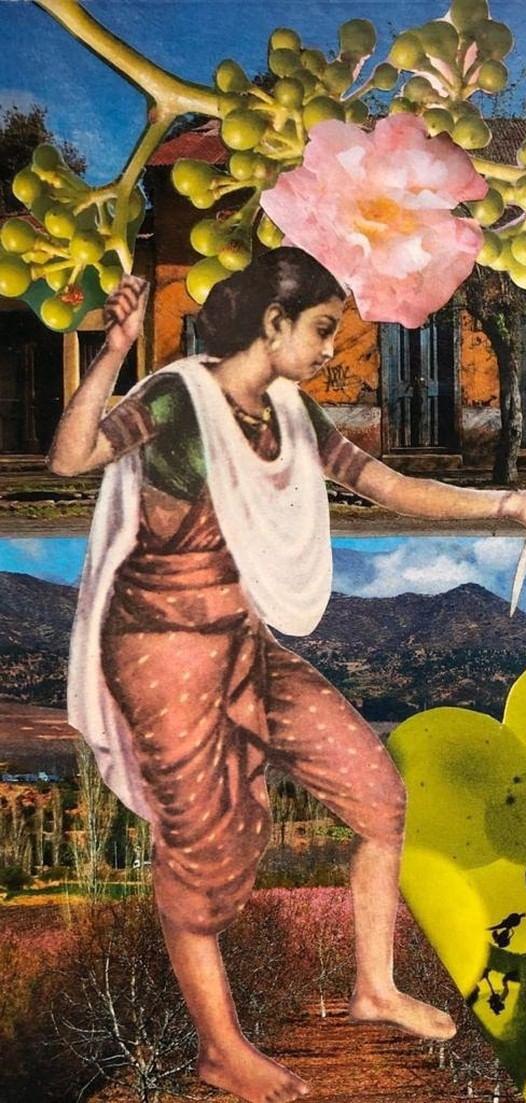

Nevertheless, at the opposite side of the individualism that consumption promotes, we find popular organisation and coordination. In the face of a lack of food distribution by the government, many communities have been cooking communal meals. Moreover, different groups have been carrying out activities to fundraise and gather money and basic products for those areas that needed them the most. This crisis has affected workers. But they have approached it with solidarity, weaving a plot that has cracked the system that governed our lives, exposing the importance of gathering together instead of staying apart.
Together with those expressions of solidarity, we have seen demonstrations that have managed to achieve some milestones. The cacerolazos have become once again a collective form of protest. In the last few weeks, Santiago has witnessed two massive cacerolazos. The first one took place in the middle of a debate about allowing Chilean people to withdraw 10% of their savings to endure the economic crisis. The second one was a response to the discontent with the precautionary measures imposed to a man accused of rape and sexual abuse to several women. While it is impossible to gather to protest in the streets, banging

our saucepans in the doors of our house has become a new way of letting those in power know that we are still paying attention to their actions. And that we will hold them accountable for their decisions.
On the last 8th of March, feminists took part of one of the biggest demonstrations that have ever taken place in Chile. Four months after, we are still confined. However, I believe that this pandemic has allowed us to take a closer look, and reinforce, those ideas and demands that we were already putting forward. Care work must be a social responsibility, we must put an end to the social division of work. Working from home is a double-edged sword: it allows us to spend more time at home, but at a very high price for our lives, especially in terms of the way in which we take ownership of our time, and without much room for societal change. Finally, the capitalist system promotes individualism and mass consumption that we must fight. Nevertheless, confinement has also opened up new possibilities of organisation and togetherness, where solidarity has been crucial to cope with the pandemic and the needs that it generated. A solidarity that has allowed us to see and to demonstrate from our homes, in spite of not being able to touch each other, gathering our bodies together. In this sense, it is possible to think of a stronger revolutionary scenario when confinement ends. If we have managed to survive, let it be to fight. ·

MOTHERHOOD IS A MESSY THING
It is the first time I write about it after becoming a mum. Out of all the constant things in motherhood, guilt is what haunts me the most. It has always been there, day and night, since my pregnancy. But, I admit, quarantine has exacerbated it.
I, an infant’s mother, found myself having to make decisions that made me desperate: Should I stay at my mum’s as I was or go back home? Can I take care of the baby alone, without extra support? Is allowing the father to visit him at this moment an important or a reckless decision?
All these questions appeared in a scenario with an increasing number of victims in Brazil. A scenario of neglect and lack
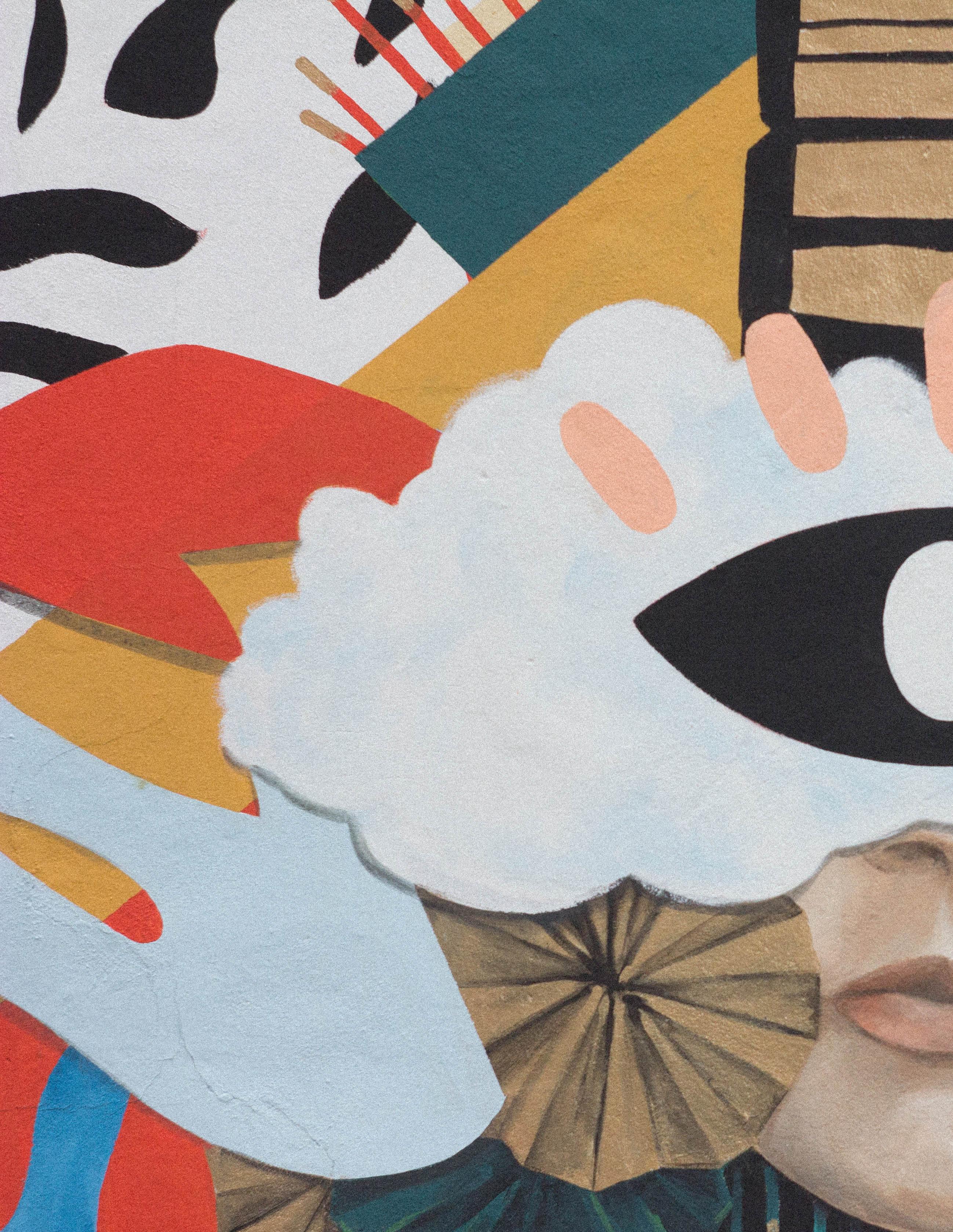
of presidential leadership, along with the population’s careless behaviour - including that of neighbours and close family members. My solution at first was to lock myself at my mum´s. A complete isolation with the minimal contact with everyone and everything. I thought: It is for the safety and health of my baby.
However, the quarantine, which was originally supposed to last 15 days, was now over its second month. I wasn’t at my own home, I didn’t have any of my son’s stuff with us: tub, feeding chair, baby plates and cups… Things were either finished (no diapers, wet wipes or diaper ointment) or wouldn’t fit him anymore (he had absolutely nothing to wear, actually he was using some of my clothes). I had no structure to work and no time for myself - having to
take care of the baby, do all house chores and clean and disinfect everything the whole time was consuming me physically and mentally. Going back home was inevitable.
Making the decision to call back the nanny felt like a failure: I can’t handle being alone with my baby. Taking my son to be vaccinated and hearing he couldn’t take it anymore because it was past the deadline was like a punch in the stomach: I can’t take care of him. Day after day, the guilt was consuming me during confinement.
Guilt for believing I had done everything wrong in the beginning, guilt for thinking I am doing all wrong now. Guilt for not being a “super-mum” and foreseeing and avoiding this situation.

And, the funny, maybe tragic, thing is that I only realised that when I sat here to write my experience of motherhood in confinement. Guilt is so present in motherhood that we end up normalising the feeling.
Currently, my support network helps me in many moments. Once I realised this wasn’t happening only with me, but with all mothers around me - those that have newborns, infants, toddlers, older children and even the pregnant ones - I could talk about my insecurities and my fears with them.
Telling a friend I decided to isolate my son even from his dad in the beginning of the pandemic, has made her feel less guilty about being afraid of letting her baby dad (who came from abroad) hold their daughter.
Listening to another mother sharing her frustration of not being able to teach her child at home, through online classes, has helped me to be less hard on myself for not being capable of making my son eat everything in the weaning process.
I have realised that the support network doesn’t only exist to “teach” you what to do or to tell you what has gone right. But it is also there to share what has gone wrong, all the distress of not knowing what to do, the fear of making mistakes and not being able to handle it.
Today, after 4 months of quarantine, I believe the psychological help from my support network has made me feel more confident to face those emotions during this period. I am very thankful for all those women who were willing to calm me down, listen and exchange experiences. You might not know the importance of a psychological support network for a mother in quarantine. I am forever grateful.· Amanda Cruz

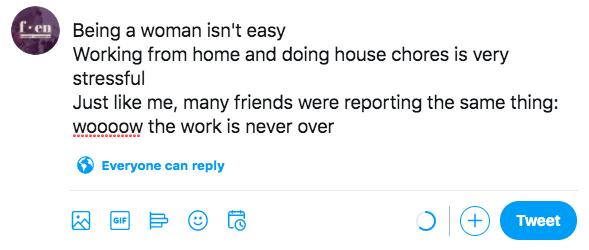
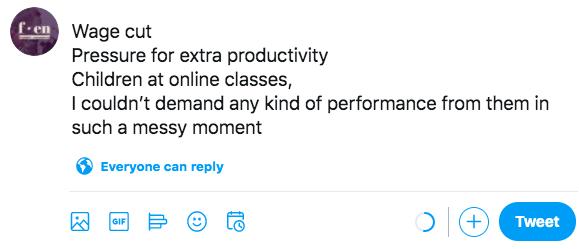
HELLEN

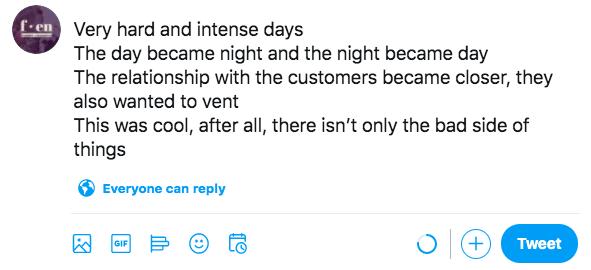
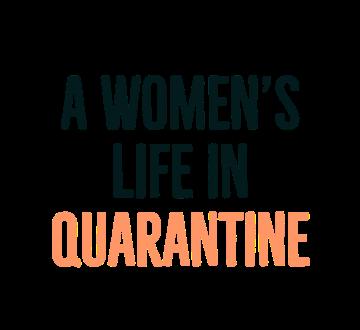
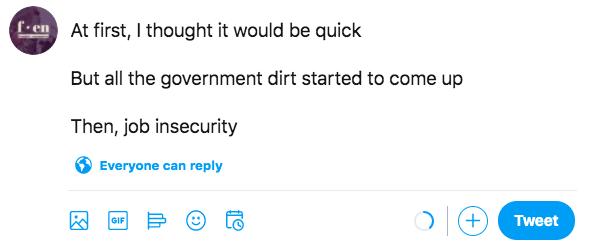
Adjusting 20sJuly 28, 2020
The year that seems to have no apparent ending. Growing up, I always fantasized my life would come together like that of a movie. Until you wake up and realize that you’re twenty-one playing the lead of the movie “Groundhog Day”. Not anyone’s ideal choice. I’m sure I wasn’t the only one that relived the same day for the past five months over and over again.

Reminiscing the days and months we took for granted, while still attempting to wrap my head around defining “normal”. I understand things will never go back to the way that they once were. They never do. When nine eleven struck, almost every airport security incorporated screening prior to check-in. The two are very far in comparison, although both happened to fall after the year nineteen-ninety nine and took place in a time in history that I’ve been less fortunate enough to be part of. History never fully repeats itself, but one common cycle is the ‘change’ that follows. Change in pace. Change within society. Change in the realization of what was once considered normal. Change that is brought to us from fear. It’s difficult to adjust, time is the only thing that helps the process. It could be infinite for all we know. It’s hard for us to accept it for what it once was. There’s a lot of change that we’ve grown accustomed to: gay marriage, the rise of feminism, the black lives matter movement, acceptance throughout society that it is okay to be different without having to justify your existence. You can see that change within your peers and people close to you that are of different ages. Regardless, I’m thankful to exist in the time that is now. Our generation habitually accepts people for who they are rather than comparing them to what once was. We do live in a time where isolation is amongst us. There are things we sadly cannot change and confinement being one. We’ve been stripped from human connection. Daily encounters that we’re still in the process of adapting to. A routine that is now broken.
The beginning was, of course, the most difficult, especially for someone like myself who fears even the thought of being left alone. I had just moved to Santa Monica three weeks prior to COVID. For the first time, I felt like I fell into a routine that satisfied my needs. Just like that, I went home to Chicago shortly after. A two-day work trip that extended into two very unexpected months filled with unhealthy cycles that seemed to be the new norm. I was fortunate enough to be surrounded by my family and friends. My grandmother was in town, which helped. I spent most of my
days isolated from reality. Working from home was, of course, difficult. Everything seemed to be forgiven. Absence was all that was present. No one knew the concept of time. We were all just working to satisfy our mental health. Mentally, isolation had a huge toll on my health. I was not at a stable place in my life to handle all the noise that was surrounding me. Whether that was the news, my family and friends, work, opinions that were far forming truths or potential lies. No one seemed to have an answer to the big question, just scattered noise. I spent most of my days adapting to a new routine which consisted of lots of walks, music, and picking up journaling as a form to escape. It helped. We were given no choice but to adjust. The stress that the times brought to us also welcomed shingles into my life. I’m thankfully now healthy and stuck with the memory on my arm (scar) that formed from self-isolation and inhumane structures to life. “The drun k s were ricocheting The old building s down t own emp t y so long ag o. Windows brok en and dreaming So hap py t o leave wha t wa s my home Wi t h a s ky blue s ky Thi s rot t en time Wou ld n’t seem so bad t o me now Oh, I did n’t die I shou ld be sa ti sfied I s urvived Tha t ’s g ood enoug h f or now” - Sky Blue Sky by Wilco (2 007) The ways of the current world, fortunately, introduced patience to someone who always glanced at the clock in constant movement, hoping for the next hour or day to come. The lesson of life, coming to the realization of just how precious it all tends to be. We lived at a pace that was too fast for us to keep up with, at least in a healthy manner. And we were forced to slow down. All the time in the world to be productive, only to realize that productivity was never the issue. People are what keep us together. Realizing we filled our days with distractions that kept us distant from sitting alone with past traumas, and especially ourselves. Regardless, we were forced to know and understand that it all reaches the surface at some point in time, reconnecting and forgiving was part of it. We took for granted simple life things like giving a stranger a hug, seeing an artist perform live, having a night out with your friends, experiencing your favorite meal with your loved ones at a crowded restaurant, a meeting with a colleague, travelling to a new destination, and most importantly socializing and being present. It will all piece itself together, just a matter of when.

A life without a mask. What once was “normal”. My idea of normal.
Kind Regards, Natali Tzvetkova
CONFINEMENT READING F-EN list
MY BUTCH CAREER: A MEMOIR MY FATHER’S GARDEN AFTERLIFE QUEEN FOR A DAY: TRANSFORMISTAS, BEAUTY QUEENS AND THE PERFORMANCE OF FEMININITY IN VENEZUELA PURPLE HIBISCUS WOMAN AT POINT ZERO LETTER TO MY DAUGHTER BLACK LOOKS: RACE AND REPRESENTATION THE FORCE OF NON-VIOLENCE LIVING A FEMINIST LIFE FEMINIST, QUEER, CRIP

ESTHER NEWTON HANSDANSOWVENDRA SHEKHAR JULIA ALVAREZ MARCIA OCHOA
CHIMAMANDA NGOZI ADICHIE NAWAL EL SAADAWI MAYA ANGELOU BELL HOOKS JUDITH BUTLER SARA AHMED ALISON KAFER
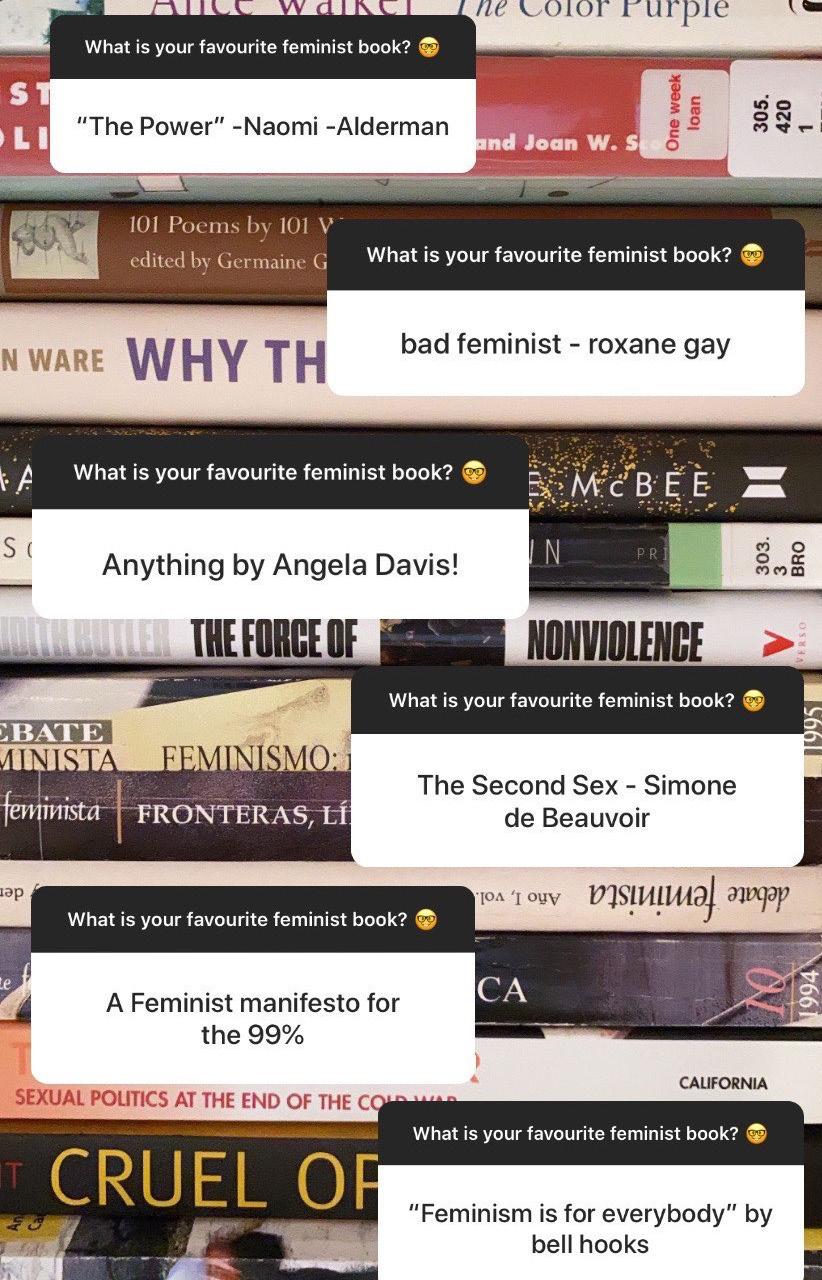
Hello! We are Chloi and Maria the faces behind @nectarnambrosia. We are two good high school friends living in London and Brussels, passionate about cooking, baking, wellbeing and sustainability. Looking forward to sharing more recipes in our Instagram (@nectarnabrosia)
Askarina Bintari
20-something millennial who likes to spend her time problematising gender representation in media. By writing and creating content on the internet, she is trying to understand and overcome her quarter-life crisis. Check out her YouTube videos at www.youtube.com/user/askarinabintari/
Ana Beatriz Riberio

* never forget when He said to cast the first stone those who have never made a mistake * Psychology student at UVA Physiotherapy student at UFRJ Passionate about acrobatic silk
Carolina Nery
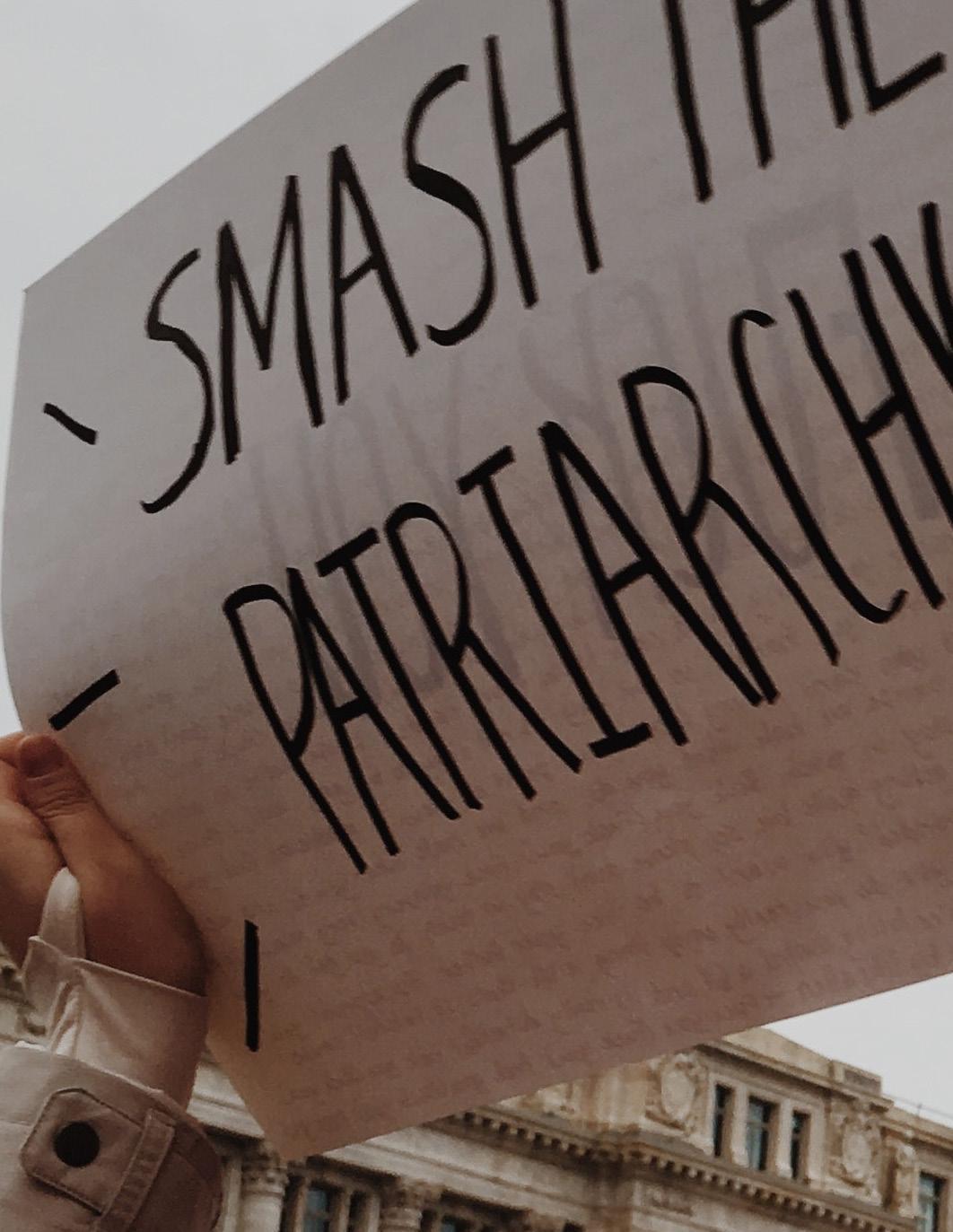

Bio: I am 21 and a psychology student; writing is one of the things I love the most. I have ever felt connected to art in general and my family has always encouraged me. For me, writing is a way to put my feelings in an affective cathartic manner, in addition to being a game with words. Since I really enjoy making collages, I have been taking up the practice of making them first and, then, using them as inspiration to write poetries. This has proven to be a great way to spare some time during this pandemic.
Carolyn Kossow (she/her)
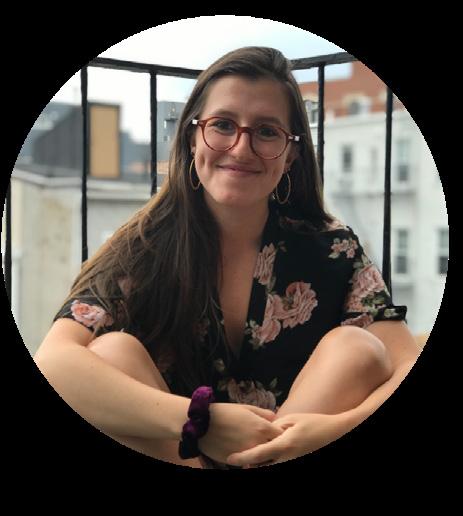
Carolyn is a gender, queer, and racial justice activist based in Brooklyn, NY. Carolyn received both her master’s and bachelor’s degrees in Gender Studies and is dedicated to a life and career advocating for social justice. She is a Communications and Development associate at Nontraditional Employment for Women (NEW) - a nonprofit providing career training to womxn entering male-dominated industries. Carolyn’s dream is to advocate for social justice, specifically supporting reproductive justice, queer rights, and anti-racist initiatives, through nonprofit work and education. In her free time, Carolyn loves playing her acoustic guitar and singing indie rock and folk music (think Fleet Foxes, Radiohead, Sufjan Stevens). She also loves to practice yoga, cook, and read fiction that centers queer, sex-positive, and feminist themes and characters!
Adriana Torres


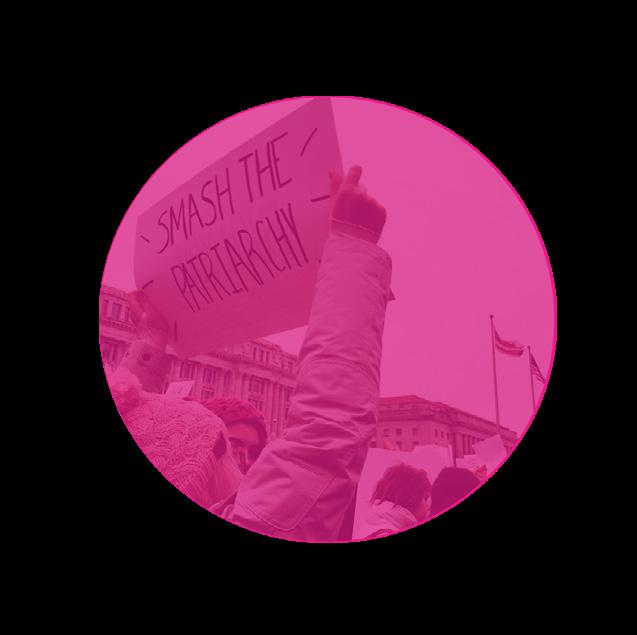
Amanda Carioni

Amanda Cruz

Duda Costa

Emilja Mikutyte


Natali Tzvetkova

Phoebe Dobson
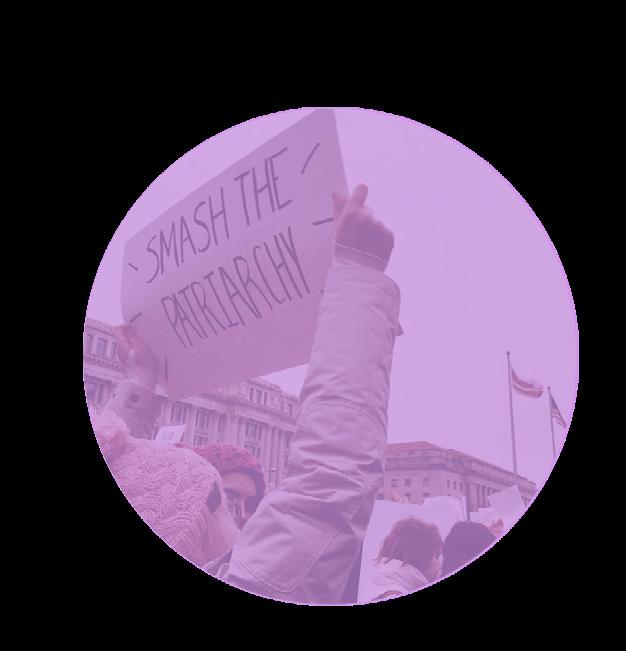
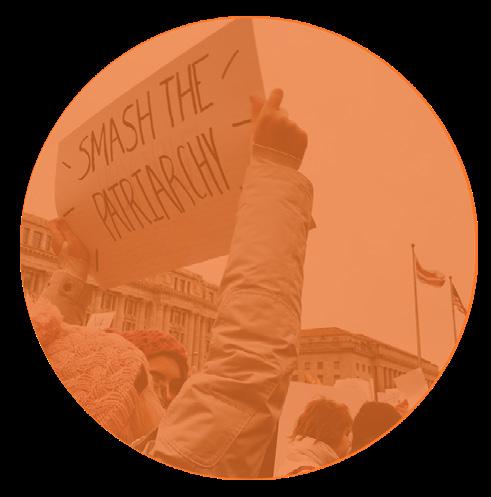
A straight talking Black Queer woman who is interested in phenomenology and the Black body. Lover of art and all things creative. A self identified coffee shop snob
Flavia Schmidt

Scrub nurse and reiki therapist. Passionate about learning, she is constantly looking for evolution and healing, both others and herself. Strong believer in love as the most vigorous power in the universe.
Hellen
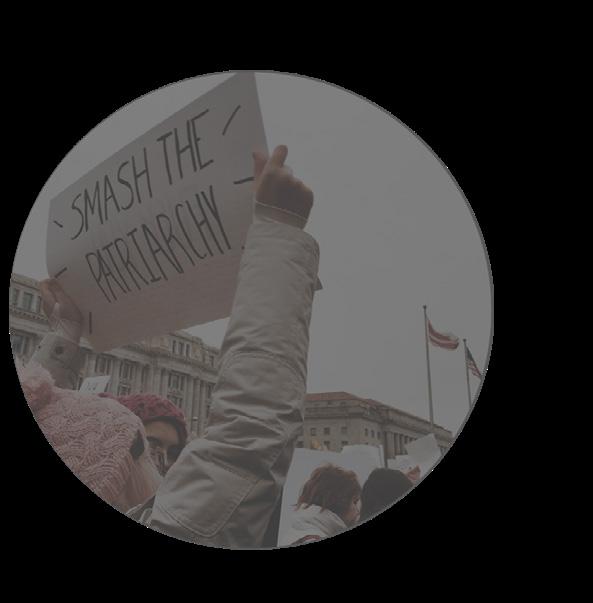
Store manager
Julio Bottoni
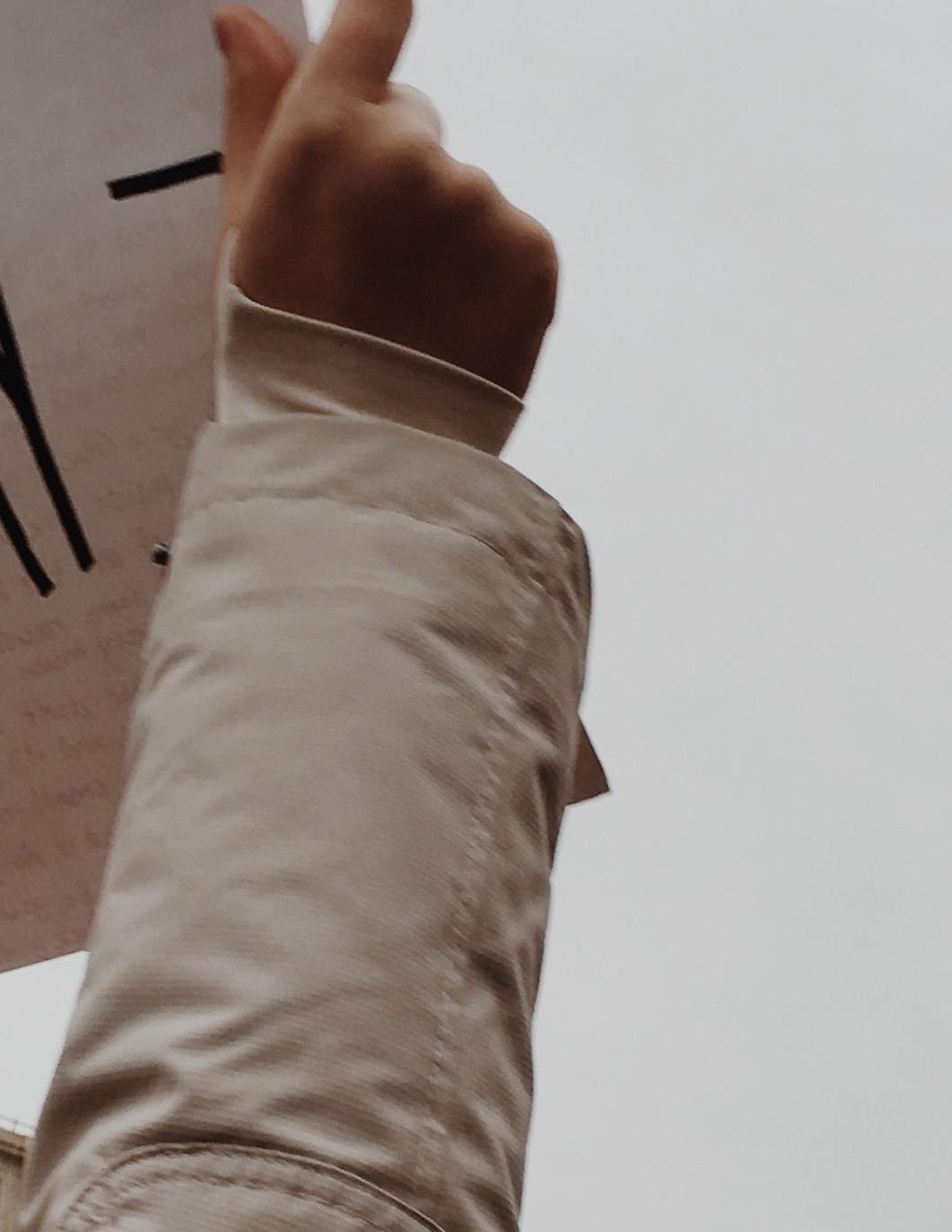
Dance teacher

Sofia Fuchateau

Brazilian psychology student who wishes to better understand and help heal humans.
Patricia Barrios

Spanish activist, software developer and (c)a(t)nimal lover, not necessarily in that order, with a background in mathematics and computer science. Trying to bring a feminist perspective to her techie environment.









